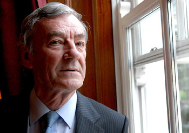 I spent a lot of today at the Law Student Colloquium which I mentioned in my previous post; and it was a great deal of fun. The day culminated with the First Annual Brian Lenihan Memorial Address, delivered by former academic and retired judge Bryan McMahon (above left), on the topic of
I spent a lot of today at the Law Student Colloquium which I mentioned in my previous post; and it was a great deal of fun. The day culminated with the First Annual Brian Lenihan Memorial Address, delivered by former academic and retired judge Bryan McMahon (above left), on the topic of
Judging.
He told us that a judge has a front row seat in the theatre of life; and, in his characteristically erudite and witty speech (citing all the great legal philosophers, including Groucho Marx, Maurice Chevalier, and Joe Duffy), he gave a wonderful review of the dramas, comedies and tragedies that have played out in his courtrooms. It was, he said, all very different from the jurisprudence of judging with which he was concerned as an academic, and yet he brought all his academic rigour to bear on the analysis of his twelve years on the bench, during which he said he sat in every county in Ireland.
The heart of his discourse was a discussion of judicial attributes. The essential traits include courtesy, patience, knowledge of the law, the ability to listen, the ability to make a decision, and the ability to give reasons for those decisions. Judges, he said, are paid not necessarily to be right but to make decisions. He went straight from practice to the bench without formal judicial training, but he said he received lots of good informal advice from his colleagues. The best, he said, was never to be rushed into a decision. It is the essence of judging to make decisions, and they have to be made with due care and proper speed, but, even so, they must not be rushed. I think that this is sound advice for life, not just for judging. Desirable judicial traits, he said, include wisdom, confidence, humour, and a good knowledge of the law (his emphasis; and he included jurisprudence in his enumeration).
He reminded us that, in every case, there are two sides, so judges’ decisions are never inevitable: there are at least two competing arguments, and often many possible alternative solutions. He welcomed the development of written decisions submissions* in High Court cases, but whilst he saw them as extremely helpful, he said that judges have to be careful not to let such submissions narrow their focus to just those two presented solutions.
He also reminded us that judges face different challenges in distinct kinds of case and in disparate areas of law. He gave three examples. First, the kind of discretion which a judge in a civil case has in determining a remedy such as a level of damages is very different from the kind of discretion which a judge in a criminal case has in determining a custodial sentence. Indeed, he said that he found criminal sentencing a profound responsibility and a matter of great difficulty. Second, he said that the judge’s role in jury trials is very different from non-jury trials. In such cases, the judge must be vigilant to maintain integrity of the jury – an onerous and increasingly difficult responsibility – and the judge must charge the jury properly. Third, he said that the skills of judging in family cases are different again. The procedure is often more relaxed, and there are a great many lay litigants. Here, the task of the judge is not one of attributing blame or focusing on the past. Instead, the judge must be mediator, educator persuader and broker as well as decision-maker. The relevant legislation provides a wide range of discretion, which allows the judge to look to both parties and children, and to look to future.
He concluded by calling into question the declaratory theory of judicial decision-making (which says that judges don’t make law, merely find and apply it). He said that judges make law all the time when making decisions on novel points and ambiguities. In open areas, judges are susceptible to three kinds influences. First, there environmental prejudices, reflecting a judge’s environment and background – these are inevitable, and for that reason ought not to be seen as problematic. Second, there are personal prejudices – these are unworthy, and judges seek to put them aside. Third, there are matters of personal intuition and emotion. Intuition, he said, is simply a sort-circuit application of experience. A judge, he said, neither cannot nor should not deny his or her true self, but rather must be self-aware.
He had said at the start of his presentation that subjectivity is not necessarily a bad perspective, and by his conclusion he had not only proved this, he had gone much further and demonstrated that it is a necessary perspective for good judicial decision-making. He argued that the story is everything and everything is a story; and he told us many good stories tonight. He argued that the power of narrative can be compelling; his narrative certainly was. He concluded that literature is unparallelled in providing insight into and experience of the full range of the human condition, and certainly provided a great insight into the full range of a judge’s decision-making.
It was a fitting tribute to Brian Lenihan, and it was an excellent conclusion to a wonderful day.
* Update: typo corrected on foot of comments below.
“He welcomed the development of written decisions”
I presume a “typo” – it should be “submissions” ?
Hi Fergus
Thanks for spotting this. Yes, indeed; that’s a typo – duly corrected.
Eoin.